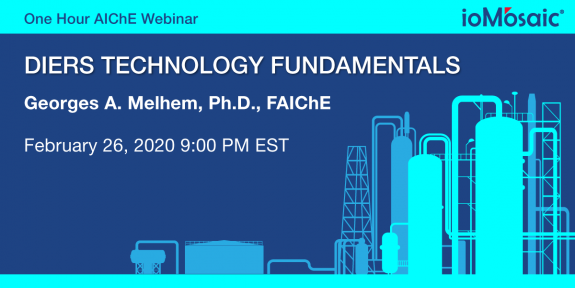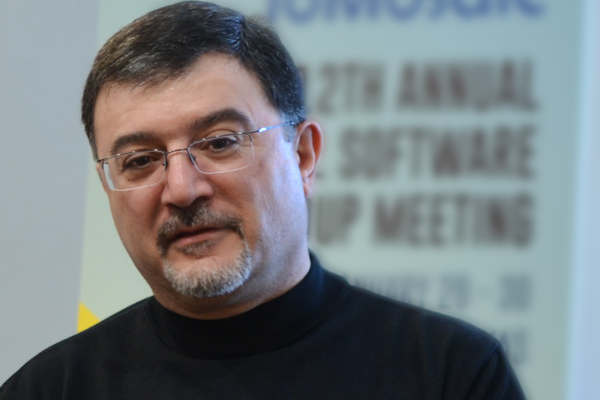
Speaker: Georges A. Melhem, Ph.D.
How can the frequency, severity, and consequences of accidental releases be reduced? What technology exists to improve the design of emergency relief systems and what new techniques are being developed? Join us on February 26, 2020 as Georges A. Melhem, Ph.D., FAIChE, will discuss how practices developed by the AIChE Design Institute for Emergency Relief Systems (DIERS) improve both the design and operations of pressure relief and effluent handling systems to improve plant safety.
Abstract: Prevention of accidental releases begins with a thorough emergency relief system design strategy. The AIChE Design Institute for Emergency Relief Systems (DIERS) was formed on this mandate in 1976 and has developed relief and effluent handling systems design and evaluation methods now used worldwide. This webinar presents an overview of DIERS and its technology: why was the DIERS technology developed, how has it evolved, and what impact has the research had. Two publications will be discussed, DIERS Project Manual and Guidelines on Pressure Relief and Effluent Handling Systems (2nd Ed.), to demonstrate how the development of this technology improves process safety.
Bio: Georges A. Melhem, Ph.D., FAICh E is President and Chief Executive Officer of ioMosaic, and is an internationally known expert in the areas of pressure relief and flare systems design, chemical reaction systems, process safety, and risk analysis. As the founder of ioMosaic Corporation, he has over 30 years of engineering and process safety experience, and has participated in numerous risk management, consequence analysis, and quantitative risk assessment studies for commercial and government clients. He currently serves the Vice Chair/Secretary for DIERS and he has been active in the organization for over 20 years.
E is President and Chief Executive Officer of ioMosaic, and is an internationally known expert in the areas of pressure relief and flare systems design, chemical reaction systems, process safety, and risk analysis. As the founder of ioMosaic Corporation, he has over 30 years of engineering and process safety experience, and has participated in numerous risk management, consequence analysis, and quantitative risk assessment studies for commercial and government clients. He currently serves the Vice Chair/Secretary for DIERS and he has been active in the organization for over 20 years.
Dr. Melhem has provided litigation support and expert witness testimony to domestic and international cases including disputes over recognized and generally accepted good engineering practices (RAGAGEP), design practices for flare systems and effluent handling, and numerous major fire and explosion events. Dr. Melhem is also the author/co-author of multiple books, many technical papers and presentations, and more than 300 technical reports regarding various aspects of risk assessment.
|
Topic: AIChE's Virtual Local Section January meeting (primary) |
|
Time: Feb 26, 2020 09:00 PM Eastern Time (US and Canada) |
|
Join Zoom Meeting |
|
Meeting ID: 650 889 375 |
|
One tap mobile |
|
+19292056099,,650889375# US (New York) |
|
+16699006833,,650889375# US (San Jose) |
|
Dial by your location |
|
+1 929 205 6099 US (New York) |
|
+1 669 900 6833 US (San Jose) |
|
888 475 4499 US Toll-free |
|
877 853 5257 US Toll-free |
|
Meeting ID: 650 889 375 |
|
Find your local number: https://zoom.us/u/ai5uWhmhK |
|
Topic: AIChE's Virtual Local Section January meeting (alternate 1) |
|
Time: Feb 27, 2020 06:00 AM Eastern Time (US and Canada) |
|
Join Zoom Meeting |
|
Meeting ID: 961-349-601 |
|
One tap mobile |
|
+19292056099,,650889375# US (New York) |
|
+16699006833,,650889375# US (San Jose) |
|
Dial by your location |
|
+1 929 205 6099 US (New York) |
|
+1 669 900 6833 US (San Jose) |
|
888 475 4499 US Toll-free |
|
877 853 5257 US Toll-free |
|
Meeting ID: 650 889 376 |
|
Find your local number: https://zoom.us/u/ai5uWhmhK |
|
Topic: AIChE's Virtual Local Section January meeting (alternate 2) |
|
Time: Feb 27, 2020 01:00 PM Eastern Time (US and Canada) |
|
Join Zoom Meeting |
|
Meeting ID: 783-736-714 |
|
One tap mobile |
|
+19292056099,,650889375# US (New York) |
|
+16699006833,,650889375# US (San Jose) |
|
Dial by your location |
|
+1 929 205 6099 US (New York) |
|
+1 669 900 6833 US (San Jose) |
|
888 475 4499 US Toll-free |
|
877 853 5257 US Toll-free |
|
Meeting ID: 650 889 377 |
|
Find your local number: https://zoom.us/u/ai5uWhmhK |
|
UTC Offset |
Example Location |
Primary Meeting |
Alt 1 Meeting |
Alt 2 Meeting |
|
UTC Time |
Feb 27, 2:00 AM |
Feb 27, 11:00 AM |
Feb 27, 6:00 PM |
|
|
UTC-8 |
Los Angeles, USA |
Feb 26, 6:00 PM |
Feb 27, 3:00 AM |
Feb 27, 10:00 AM |
|
UTC-7 |
Phoenix, USA |
Feb 26, 7:00 PM |
Feb 27, 4:00 AM |
Feb 27, 11:00 AM |
|
UTC-6 |
Mexico City, Mexico |
Feb 26, 8:00 PM |
Feb 27, 5:00 AM |
Feb 27, 12:00 PM |
|
UTC-5 |
New York, USA |
Feb 26, 9:00 PM |
Feb 27, 6:00 AM |
Feb 27, 1:00 PM |
|
UTC-3 |
Santiago, Chile |
Feb 26, 11:00 PM |
Feb 27, 8:00 AM |
Feb 27, 3:00 PM |
|
UTC-3 |
Sao Paulo, Brazil |
Feb 26, 11:00 PM |
Feb 27, 8:00 AM |
Feb 27, 3:00 PM |
|
UTC+0 |
London, UK |
Feb 27, 2:00 AM |
Feb 27, 11:00 AM |
Feb 27, 6:00 PM |
|
UTC+1 |
Lagos, Nigeria |
Feb 27, 3:00 AM |
Feb 27, 12:00 PM |
Feb 27, 7:00 PM |
|
UTC+2 |
Cairo, Egypt |
Feb 27, 4:00 AM |
Feb 27, 1:00 PM |
Feb 27, 8:00 PM |
|
UTC+3 |
Istanbul, Turkey |
Feb 27, 5:00 AM |
Feb 27, 2:00 PM |
Feb 27, 9:00 PM |
|
UTC+3.5 |
Tehran, Iran |
Feb 27, 5:30 AM |
Feb 27, 2:30 PM |
Feb 27, 9:30 PM |
|
UTC+4 |
Dubai, UAE |
Feb 27, 6:00 AM |
Feb 27, 3:00 PM |
Feb 27, 10:00 PM |
|
UTC+4.5 |
Kabul, Afghanistan |
Feb 27, 6:30 AM |
Feb 27, 3:30 PM |
Feb 27, 10:30 PM |
|
UTC+5 |
Karachi, Pakistan |
Feb 27, 7:00 AM |
Feb 27, 4:00 PM |
Feb 27, 11:00 PM |
|
UTC+5.5 |
Delhi (NCT), India |
Feb 27, 7:30 AM |
Feb 27, 4:30 PM |
Feb 27, 11:30 PM |
|
UTC+5.75 |
Kathmandu, Nepal |
Feb 27, 7:45 AM |
Feb 27, 4:45 PM |
Feb 27, 11:45 PM |
|
UTC+6 |
Dhaka, Bangladesh |
Feb 27, 8:00 AM |
Feb 27, 5:00 PM |
Feb 28, 12:00 AM |
|
UTC+6.5 |
Yangon, Myanmar |
Feb 27, 8:30 AM |
Feb 27, 5:30 PM |
Feb 28, 12:30 AM |
|
UTC+7 |
Jakarta, Indonesia |
Feb 27, 9:00 AM |
Feb 27, 6:00 PM |
Feb 28, 1:00 AM |
|
UTC+8 |
Shanghai, China |
Feb 27, 10:00 AM |
Feb 27, 7:00 PM |
Feb 28, 2:00 AM |
|
UTC+9 |
Tokyo, Japan |
Feb 27, 11:00 AM |
Feb 27, 8:00 PM |
Feb 28, 3:00 AM |
|
UTC+11 |
Sydney, Australia |
Feb 27, 1:00 PM |
Feb 27, 10:00 PM |
Feb 28, 5:00 AM |
|
UTC+8 |
Shanghai, China |
Feb 27, 10:00 AM |
Feb 27, 7:00 PM |
Feb 28, 2:00 AM |
- Log in to post comments
